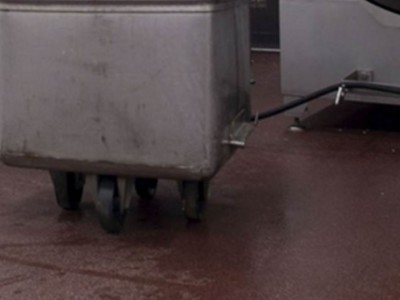Concrete floor finishes for food processing facilities
Floors in food processing facilities need to comply with strict hygiene requirements, and be highly resilient to a very challenging environment. So it’s vital to give careful thought to the products that will help the concrete floor to perform and endure.
European regulations for floors in food processing facilities
Hygiene in food processing plants is, of course, heavily regulated; and in these European regulations for food hygiene there are references to the floor.
(EC) No 852/2004 (Hygiene of Foodstuffs) states that “floor surfaces are to be maintained in a sound condition and be easy to clean and, where necessary, to disinfect.” It goes on to say that this will demand that impervious, non-absorbent, washable and non-toxic materials are used; and that floors should allow adequate surface drainage, where appropriate.
The exception to this is for certain traditional food products, where the building helps to shape the product’s characteristics, as stated in (EC) No 2074/2005.
(EC) No 853/2004 (Specific Rules – Food of Animal Origin) states that slaughterhouses must “have installations that prevent contact between the meat and the floors, walls and fixtures”, to avoid meat contamination.
The delicate nature of a concrete floor
Although one may think of a concrete floor as being solid and robust, in terms of its resistance to chemicals an unfinished concrete floor can be very vulnerable indeed.
Many common substances found in a food manufacturing environment can easily damage a floor. For example, spillages of beer, cider, fruit juices, fermenting fruit, sugars, and even milk will slowly corrode a concrete floor (as stated in TR34, Appendix B to the 3rd edition).
Even though foods are not supposed to make direct contact with floor, spills and drips of damaging oils and fats are commonplace.
What’s more, the porous nature of concrete allows the spillage to be absorbed into the floor, and thus bacteria can breed easily. Pressure washing will rapidly damage the floor’s surface and so ultimately make the problem worse.
Hence an unfinished concrete floor cannot be considered a hygienic, durable option for food manufacturing premises.
Protect the floor with a heavy duty polymer screed
A bonded polymer screed will provide a suitable concrete floor topping for food processing facilities, but only if it has been formulated to withstand the rigours and common threats.
There is no formal testing standard for screeds for food manufacturing premises (only the general standard for floor screeds, EN 13 813). So it is important to look closely at the product characteristics, and consider a polymer screed which will ensure the requirements of (EC) No 852/2004 are met.
These characteristics include:
- Chemical resistance – so that the floor can withstand regular cleaning with dilute cleaning chemicals.
- Abrasion resistance – so the floor’s surface will resist scratches, which could allow corrosive substances to infiltrate the concrete slab underneath.
- Non-toxic – to prevent any risk of contamination to the food.
- Stable at the required temperature/s – eg, for facilities with extremes of temperature, such as bakeries or cold stores.
- Slip resistance – so that if spills should occur, the surface doesn’t become perilous for staff.
- Colourful – so that a contrasting colour can be used to ensure spills can be easily seen (eg, a blue floor could be used in a factory where white flour is processed).
We recommend you consider our Indurit or Indurit Flow screed which have been created with food processing premises in mind. Please contact us if you have any queries about the suitability of any of our polymer screed products for your application.




